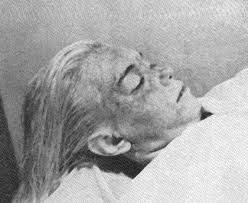
I know a man in Christ who prays for Marilyn Monroe every day as a part of his prayers for all the departed. He doesn’t pray for her under her stage-name of “Marilyn” though. He prays for her under her real name of “Norma Jeane”, the name given her by her mother and under which she was once baptized by (of all people) the evangelist Aimee Semple McPherson while under the foster care of a very fundamentalist family.
Monroe was and remains a much misunderstood woman. She not only adopted the stage name of “Marilyn Monroe” when her real married name was Norma Jeane Doughtery, but also adopted the persona of the blond sex-pot bimbo, despite the fact that she was quite intelligent and owned and read hundreds of books, including James Joyce’s Ulysses. It was, after all, the 40’s and 50s and there were few ways women who looked like her could make a living in Hollywood where she lived and where her mother once worked.
More tragically she almost certainly suffered from what today would be diagnosed as Borderline Personality Disorder, which made it difficult for her to sustain long-lasting relationships. Elton John’s song about her Candle in the Wind recognized that she “never knew who to cling to when the rain set in”. This was almost certainly the result of her biological father abandoning her mother before Norma Jeane was born, and the trauma of being abandoned by her mother after she was hospitalized in an asylum when Norma Jeane was very young so that she spent time in an orphanage and in a number of foster homes—including one in which she was sexually molested.
She was not a Christian, despite (or perhaps because of) her fundamentalist upbringing in a number of foster homes. The churches of the day (such as the Roman Catholic Church) were not kind to her; the Catholic “Legion of Decency” constantly denounced her films, despite the fact that by today’s Game of Thrones standards they were pretty tame. In fact in the famous skirt-blowing scene in the film The Seven Year Itch (which so enraged her then husband Joe DiMaggio that he beat her up and left her with bruises) her skirt never really blew up much above her knees.
Marilyn desperately wanted children, and was devastated by her two (some authorities say three) miscarriages. She died of accidental overdose in 1962 (inset photo is from her autopsy when the blood had started to congeal in her face).
This is all fascinating, but Hollywood contains many such tragedies. Why pray for Marilyn? The person who daily prays for Marilyn answered it in this way: “Everyone should have someone who prays for them after they’re gone. Most Christians regard Monroe as a brainless Hollywood sex-pot, and would never think of praying for her. Those who knew her better and admired her are not usually Christians, and do not pray for the dead. Since probably no one else is praying for her, I will. It might be a waste of time, but I have wasted time in worse things than useless prayer.”
I understand this. It is for the same reason that I pray daily for the Rev. H.A. Maxwell Whyte. Whyte was a Pentecostal pastor who flourished in Toronto in the 70s (see inset). Looking back on his teaching ministry with more scholarly and Orthodox eyes, I now know that exegetically he got practically everything wrong, including his insistence that the Pope was the Antichrist. He was self-taught, and his view of church history was unsophisticated to the point of absurdity. Nonetheless, I loved him anyway, and often attended his Sunday evening services with my mother. I keep Pastor Whyte in my prayers because the Orthodox who pray for the departed have never heard of him, and the Pentecostals who might remember him never pray for their dead. Everyone should have someone who pray for them after they are gone, and so I undertake that task.
This obligation to pray for others devolves upon us because we are all interconnected spiritually. In the world we are all children of a common Lord by virtue of creation, and in the Church we are all members one of another in Christ. We are therefore obligated to pray for one another, to uphold each other in prayer and commend to God those whom we know.
This can even become a part of our daily life. When we hear a siren in the distance, we can make the sign of the cross and commend to God those for whom the siren sounds (or possibly for whom the bell tolls). When we pass someone in the street while out for a walk, we can quietly ask God to bless them. We may not know their name or their story or anything at all about them, but we know that God made them and loves them. God calls us to be a blessing to others in the world, including strangers whom we will never actually meet or get to know. We should therefore pray for all, perhaps especially for the non-Orthodox and those for whom no one else will pray. And that includes Pentecostal pastors like H. A. Maxwell Whyte. It even includes people like Norma Jeane.
